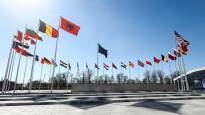Finland will officially join the military alliance NATO tomorrow, Tuesday, in Brussels. Finland becomes the 31st member of NATO.
Tuesday will also mark exactly 74 years since the foundation of NATO.
In this story, a research doctor from the Foreign Policy Institute familiar with NATO Iro Sarkkä answers six questions about Finland’s NATO membership.
1. Finland had to deliver the accession documents to Washington, but the matter was already taken care of on Tuesday in Brussels. Why?
NATO wants to show that it is operational and quick in its actions. Although the public message has always been that it is the fastest enlargement process in history, the slowdown in Turkey and Hungary has raised gray clouds over NATO’s open door policy. Now the Secretary General Jens Stoltenberg and NATO will take care of their part as quickly as possible.
This signals that NATO is capable of operating even in difficult circumstances if necessary and shows solid support for Finland’s NATO membership. Finland will now be included in the alliance as soon as possible.
It is also an excellent time to complete the process, when there is a meeting of NATO foreign ministers in Brussels. In addition, 74 years have passed since the founding of NATO on Tuesday. Tomorrow is NATO’s birthday, so to speak. Accepting Finland is a way to celebrate NATO’s 74th anniversary.
2. What is the significance of Finland joining NATO?
When Finland becomes a member, Finland will be an equal and equal actor in NATO’s decision-making. Starting from Tuesday’s meeting, Finland will fully participate in NATO’s joint decision-making.
At the same time, Finland will also be fully included in NATO’s defense planning process.
Membership also imposes obligations on Finland. As a full member of NATO, Finland is obliged to participate in the maintenance of NATO’s common defense and deterrence.
3. What will change in Finland’s defense and foreign policy after joining NATO?
Even as a member of NATO, Finland continues to develop its own defense based on national principles. Finland can itself decide the basic pillars of its defense implementation principles. They rely on universal conscription and extensive regional defense.
From a legal point of view, Finland receives NATO’s security guarantees. But membership also obliges Finland to help another member state that may be under attack with the means it deems necessary.
Finland will not be asked to do what it is not capable of. But NATO will certainly have different demands and wishes for all defense branches. Then Finland will discuss what is possible to implement.
We ourselves are defining how we become and develop as an active ally. Our role is not decided by others for us, but we decide it ourselves. But we must be open to listening to the concerns of other members and the common needs of the alliance.
4. How does NATO membership affect the position of Finnish reservists?
Professional soldiers, i.e. voluntary regular personnel of the Defense Forces, are sent to NATO-led operations. Voluntary reservists can also be sent.
No one is sent anywhere against their will.
5. What kind of costs will Finland have from NATO membership?
NATO’s membership fee is estimated at 70–100 million euros annually. They go to the maintenance costs of NATO’s administrative structures and the annual costs of joining the command structure.
In addition, the troops on standby for NATO-led operations incur costs. These indirect costs are the largest expense items. The price tag depends on how many troops are ready, what kind of troops they are and where they operate.
A member country that respects NATO’s goals should prepare for the fact that two percent of the gross national product will be the minimum level of the defense budget for the foreseeable future. Currently, Finland will reach the goal until 2026 thanks to the material projects.
The investment must be permanent if the goals are to be achieved. In addition, supporting Ukraine against a Russian attack will cause additional costs.
6. How is Sweden’s NATO application now in relation to Turkey and Hungary?
NATO Secretary General Jens Stoltenberg’s press conference today was twofold. In Stoltenberg’s communication, there were turns of phrase that were worrying from the point of view of Sweden’s membership. On the other hand, he probably wanted to reassure Sweden that Sweden is practically already protected by NATO’s umbrella, even though the country is not a full member.
Stoltenberg’s speech sounded like plans have already been made for Sweden as well. He referred to the temporary performance goals and the integration of Sweden into NATO’s command structure. So the work does not start from scratch, but NATO is waiting for the moment when Turkey and Hungary ratify Sweden’s application.
The pressure on Turkey behind the scenes continues. But NATO and Stoltenberg are not capable of magic tricks. The Turkish parliament will apparently be on recess in about a week due to the upcoming elections. If Sweden’s ratification does not happen by then, it will be postponed by at least a month.
It may very well be that Turkey postpones the ratification until after mid-May, when the elections are over.
You can discuss the topic until 23:00 on April 4.
